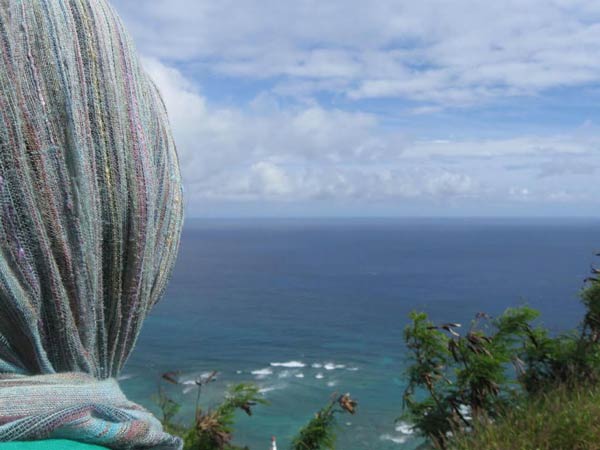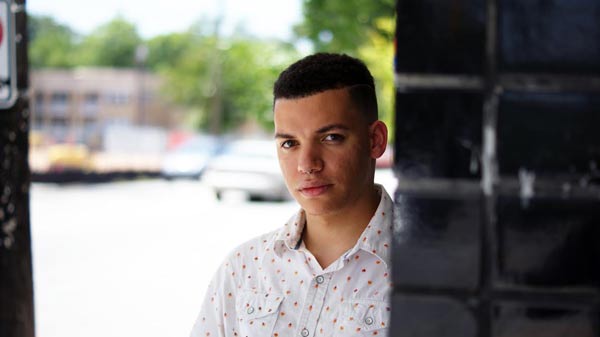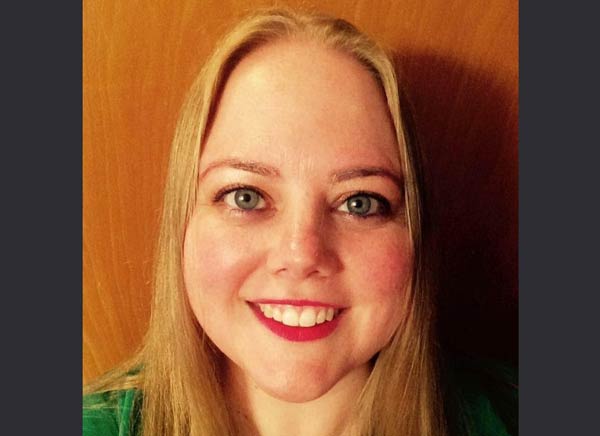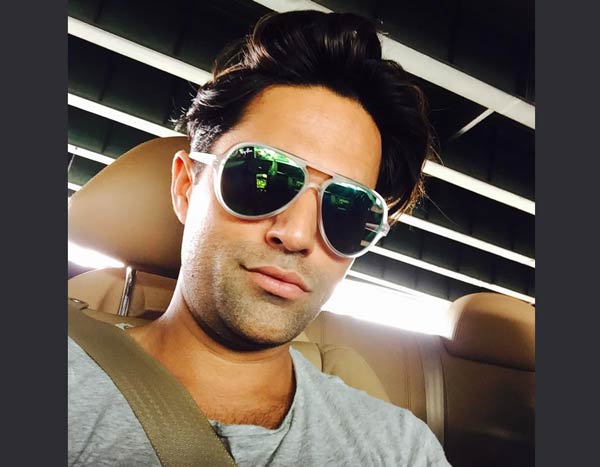Muslims have generally viewed homosexuality as taboo and most condemn it. In a 2014 Pew Research Study, only 45% of Muslims say homosexuality should be accepted by society and 52% opposed allowing gay and lesbian couples to marry legally. The results clearly reflect controversy within the general Muslim public about LGBTQ (Lesbian, Gay, Bisexual, Queer and Transgender) individuals, including Muslims. In the wake of the tragic mass shootings in Orlando, silence surrounding being Muslim and LGBTQ is breaking with members speaking out.
Identity: ‘A billion Muslims and a billion ways to be Muslim’
It’s much easier to identify film and video artist, HXA (pseudonym), as Muslim than Queer. That’s because she wears hijab, the traditional Muslim headscarf.
HXA is a practicing queer Muslim.
“I don’t think that someone has to practice a certain way or look a certain way to be considered a Muslim…there are a billion Muslims with a billion ways to be Muslim,” HXA said.
HXA is Asian decent and has not informed all of her family members of her sexual identity. She says it is a constant struggle since Muslim and queer individuals are usually rejected by the community.
“It’s terrible,” HXA says about how most Muslims feel about LGBTQ people.
HXA says she is unable to watch much of the Orlando shootings media coverage as it is still raw and overwhelming for her.
“One part of my community has killed another party of my community,” HXA said.
HXA believes the shooter may have been motivated by his own identity struggles as a gay Muslim and says the community needs to acknowledge this issue.
“Muslim communities need to address homophobia,” HXA said.
She believes that Islam is ‘inclusive’ and has room for people of all sexual identities.
“Being queer is not a choice. Being Muslim is a choice I make every day,” HXA said.
Intimidation: LGBTQ fear and silence
Dev 21, is a gay Black Muslim convert. He chooses not to share his sexuality when he is around Muslim community members because it often creates feelings of anxiety and rejection.
“There is so much homophobia and toxic masculinity within the Muslim community (don’t get me wrong – I saw just as much and probably more in the Christian community, too) that breeds large amounts of self-hate and conflicting feelings of identity within LGBT Muslims,” Dev said.
Dev says he often finds himself choosing between being outcasted from his community and silencing a part of who he is.
“Identifying proudly as both Muslim and gay, you often also feel like an outcast in the LGBT community as well to an extent,” Dev said.
Dev says his religion and sexuality are deeply integral parts of his being and that they can co-exist.
“I want the world to know that I love each and every one of my intersection identities, even when they don’t seem to make sense to me or the rest of the world,” Dev said.
The Orlando shootings left Dev feeling deeply saddened by reactions from within the Muslim
community and outside of it.
“Many queer Muslims, including myself, probably felt stuck; like everything was coming from too many angles to defend at once,” Dev said.
Dev says those who oppose being LGBT are on the “wrong side of history.”
“We need to let go and let love overcome us.”
Isolation: LGBTQ Muslim spaces
Kelly Wentworth is a white practicing bisexual Muslim Imam. She works with Muslims for Progressive Values in Atlanta as a voluntary Imam often delivering sermons and providing services to the LGBTQ community.
Wentworth struggles with Muslim and queer spaces available within and outside of the Muslim community.
“Often, Muslim spaces do not understand or accept my queer identity and queer spaces often struggle with my Muslim identity. It can be challenging to find spaces where I do not have to check one more identities in order to participate,” she said.
But Wentworth is not discouraged to create LGBTQ safe spaces. As a volunteer Imam since 2011, she has officiated over marriages, led prayers, provided basic pastoral counseling and helped connect community members to resources. She actively participates in human rights, women’s rights and LGBTQ rights efforts and is a member of the Muslim Alliance of Sexual and Gender Diversity.
“I am very privileged to have the support structures I do and it motivates me to continually work toward helping others find support and safety in regards to their sexual orientation and gender identity,” Wentworth said.
Wentworth uses her platform to voice that it is possible “to be Muslim and LGBTQ”. She references the Orlando shooter as an example of why she believes it is critical to have more conversations about identity in all communities.
“Even if you cannot comprehend the concept of LGBTQ people, the oppression has to stop. When one’s beliefs lead to the harm of others, those beliefs have to become secondary. We have to put human rights first. We cannot harm each other and justify it based on belief.”
Inclusion: ‘I accept who I am’
Aljiah D., 36, of Miami beats all odds as a gay Muslim American of Pakistani-Afghanistani descent—both of his parents accept and support his sexuality. He says this didn’t come naturally to his parents. But his confidence and love for himself led to their ‘respect’ and tolerance.
“You gotta tread along. If you are confident enough people will respect you,” Alijah says.
Alijah went through stages of denial during his earlier years of college trying to convince himself prayer would eliminate the feelings inside him. He became more religious but never felt in his element in the process.
“I tried”, he said about identifying with the Muslim community.
“To identify, you have to fit in. Most of us don’t identify with the immigrant Muslim community,” Alijah said adding their cultural views are different than his on religion.
Finally, he came to terms with his sexuality during his later years of college. He confronted his parents about it who weren’t very happy with the news their son is gay. Alijah decided to leave Dallas, his hometown, and take a job in Miami to explore more of himself.
“I accept rules and I accept who I am,” Alijah said.
Over the years, his parents became accepting and supportive of his sexuality.
“Trust yourself. Love yourself. Home is our heart,” Alijah said about the road toward acceptance.
His mother was first to reach out to him after the Orlando Pulse nightclub mass shootings. He says she was deeply concerned and reiterated “this is not right and is not what Muslims do.”
When asked what he would like to say to members of his own community that do not accept his sexuality, Alijah chose to respond with peace.
“We’re still Muslims. We’re your brothers and sisters. We’re still family. God is more concerned with the rights (we give) to people than his rights,” Alijah said.
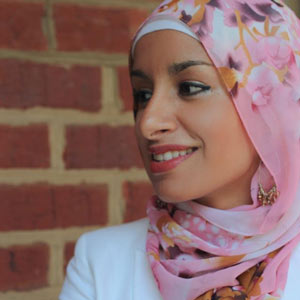 Slma Shelbayah is an award-winning Broadcast Journalist and CEO of Shelbayah Consulting. She is a Producer/Assignment Editor for CNN and also a writer for CNN.com. Her career includes breaking news coverage with CNN International, spanning the regions of the Middle East, Asia and Africa and varying across national and international topics including stories covering Arab and Muslim Diasporas. Ms. Shelbayah is also an Adjunct Professor of Business and Mass Communication at Brenau University where she teaches numerous courses including International Business Communication, Writing and Critical Thinking, Art of Leadership and Cross-Cultural Business Conflict Resolution. Website: www.slmashelbayah.com; Twitter: @SlmaCNN
Slma Shelbayah is an award-winning Broadcast Journalist and CEO of Shelbayah Consulting. She is a Producer/Assignment Editor for CNN and also a writer for CNN.com. Her career includes breaking news coverage with CNN International, spanning the regions of the Middle East, Asia and Africa and varying across national and international topics including stories covering Arab and Muslim Diasporas. Ms. Shelbayah is also an Adjunct Professor of Business and Mass Communication at Brenau University where she teaches numerous courses including International Business Communication, Writing and Critical Thinking, Art of Leadership and Cross-Cultural Business Conflict Resolution. Website: www.slmashelbayah.com; Twitter: @SlmaCNN

